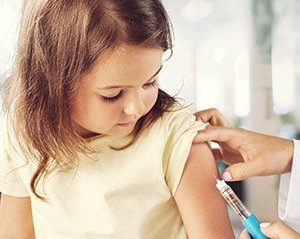- Recognizing the Signs of Hypothyroidism
- 10 Strategies to Overcome Insomnia
- Could Artificial Sweeteners Be Aging the Brain Faster?
- Techniques for Soothing Your Nervous System
- Does the Water in Your House Smell Funny? Here’s Why
- Can a Daily Dose of Apple Cider Vinegar Actually Aid Weight Loss?
- 6 Health Beverages That Can Actually Spike Your Blood Sugar
- Treatment Options for Social Anxiety Disorder
- Understanding the Connection Between Anxiety and Depression
- How Daily Prunes Can Influence Cholesterol and Inflammation
Kids Who Got Flu Shot Had Milder COVID Symptoms: Study

Here’s a new reason to make sure your kids get their seasonal flu shot.
A new study showed that it reduces kids’ risk for symptoms and severe illness if they get COVID-19.
That conclusion is drawn from medical records of more than 900 children diagnosed with COVID-19 between February and August of last year.
Those who had their current flu shot were less likely to have COVID-19 symptoms, respiratory problems or severe illness, University of Missouri researchers said.
Kids who received the pneumococcal vaccine were also less likely to have COVID-19 symptoms, according to findings recently published in the journal Cureus.
The findings are important because there is not yet an approved coronavirus vaccine for kids.
“It is known that the growth of one virus can be inhibited by a previous viral infection,” said study author Dr. Anjali Patwardhan, professor of pediatric rheumatology and child health at Missouri School of Medicine in Columbia.
“This phenomenon is called virus interference, and it can occur even when the first virus invader is an inactivated virus, such as the case with the flu vaccine,” she said in a university news release.
Patwardhan said studying children is important, because they play a big role in viral spread.
“Understanding the relationship and co-existence of other viruses alongside COVID-19 and knowing the vaccination status of the pediatric patient may help in deploying the right strategies to get the best outcomes,” she said.
Patwardhan added that it’s important now to investigate the link between vaccinations and COVID-19 symptoms in a larger geographical area with a multiracial makeup.
“Based on these findings, we hypothesize that the higher incidence of COVID-19 in minority populations may also reflect their low vaccination rate apart from other health inequalities,” Patwardhan said.
More information
The American Academy of Pediatrics has more on COVID-19.
SOURCE: University of Missouri, news release, Feb. 4, 2021
Source: HealthDay
Copyright © 2026 HealthDay. All rights reserved.










